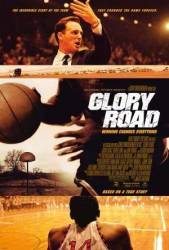Other mistake: When Haskins and the other coach are going on their recruiting trips in the beginning, we can see the two of them talking on the phone. Funny thing is, that both of them are using pay phones. So who called who? How did they know the number? And how did they know when the other one was going to be near that pay phone? I feel it is highly impossible for one to reach the other when both of them are using pay phones.

Glory Road (2006)
Directed by: James Gartner
Starring: Jon Voight, Josh Lucas, Derek Luke, Austin Nichols
Continuity mistake: After Texas beats Kentucky, Willie Cager runs up into the stands to hug his mom and it looks to be a very long hug but in the very next shot he is seen on the floor with the rest of the team and he is holding the ball in the air.
Continuity mistake: During the Kentucky game, in the second half, Shed passes the ball to Artis, then Artis passes it to Cager and Cager spins it off the backboard. Well on the bench you see Shed cheering for Cager, while the announcer is announcing what just took place. (01:41:10)
Coach Don Haskins: We do not back down here, ever.
Coach Don Haskins: You'll play basketball my way. My way is hard.
Coach Don Haskins: Hey, hey, Winnaker, Winnaker, do you want me to get you a skirt? I'll get you a skirt if you keep playing like a girl.
Question: Did coach Haskins treat his players the way he does in the movie?
Question: When Coach Haskins allows players to "play their way" why is the team more effective?
Join the mailing list
Separate from membership, this is to get updates about mistakes in recent releases. Addresses are not passed on to any third party, and are used solely for direct communication from this site. You can unsubscribe at any time.
Check out the mistake & trivia books, on Kindle and in paperback.




Answer: Yes. He really did integrate them to teach them to work as a team and give them guidance to help them off the field (such as with school work). His coaching method shown in the film is also accurate. Coaches screaming at the players, mocking them, and being what we would say is "harsh" with them was common coaching practice in the 70s that no-one would have batted an eye to. Especially in the south. Coach Boone would have especially been under pressure to show his players he meant business due to the concern that some of them might not take him seriously as a new black coach. If he had been seen as "easy", the team may not have been motivated to do as well as they did.